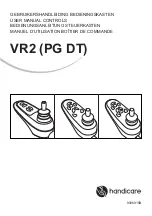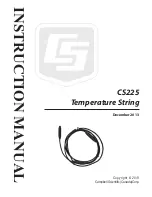
debounce
When a signal changes state using a mechanical switch or relay, the signal can oscillate briefly before
stabilizing to the new state. The debounce filter examines the signal’s transitions to determine the
signal’s state.
The signal oscillates between states after a mechanical switch
or relay activates.
Without a debounce filter, the signal is interpreted to change
state multiple times.
With a debounce filter, the signal is interpreted to change state
only once.
The factory default setting is to activate the input filtering to compensate for unclean state transitions.
decibel
A decibel is a logarithmic ratio between a specific value and a base value of the same unit of measure.
With respect to radio power, dBm is a ratio of power relative to 1 milliWatt. According to the following
equation, 1 mW corresponds to 0 dBm.
Equation: PmW = 10
x/10
where x is the transmitted power in dBm, or dBm = 10 log(PmW)
Another decibel rating, dBi, is defined as an antenna’s forward gain compared to an idealized isotropic
antenna. Typically, dBm = dBi = dBd + 2.15 where dBi refers to an isotropic decibel, dBd is a dipole
decibel, and dBm is relative to milliwatts.
deep sleep
mode
Potted Puck models, potted M-GAGE models: Some battery-powered M-GAGE radios ship in a "deep
sleep" mode to conserve battery power. While in "deep sleep" mode, the M-GAGE does not attempt to
transmit to a parent radio and remains in "deep sleep" until an LED light at the receiving window wakes
it up. M-GAGEs that ship in "deep sleep" mode are typically the potted M-GAGEs that require an LED
Optical Commissioning Device to configure the M-GAGE.
Wireless Q45 Sensors: If the Wireless Q45 Sensor fails to communicate with the Gateway for more than
5 minutes, it enters
sleep mode
. The radio continues to search for the Gateway at a slower rate and the
LEDs do not blink. To wake up the sensor, press any button. After the Q45 wakes up, it will do a fast
rate search for the Gateway for five more minutes.
default output
triggers
Default output triggers are the conditions that drive outputs to defined states. Example default output
conditions include when radios are out of sync, when a device cycles power, or during a host
communication timeout.
Device Power Up
—Outputs are set to user-defined states every time the device is powered up.
Out of Sync
—Outputs are set to user-defined states when the radio is out of sync with its parent radio.
Host Link Failure
—Host link failure is when the defined timeout period has elapsed with no
communications between the host system (or Modbus master device) and the DX80 Gateway, typically
about four seconds. Outputs are set to user-defined states when a host link failure has been detected.
Node Link Failure
—Node link failures are determined by the polling interval or the out-of-sync timing.
When a Node detects a communications failure with the Gateway and the Node Link Failure flag is set,
the output points are set to the user-defined states and the inputs are frozen.
Gateway Link Failure
—Gateway link failures are determined by three global parameters: Polling
Interval, Maximum Missed Message Count and Re-link Count. When the Node’s Gateway Link Failure
flag is set and the Gateway determines a timeout condition exists for a Node, any outputs linked from
the failing Node are set to the user-defined default state.
default output
value
Default output values are specific values written to output registers. For discrete outputs, this is a 1 (on)
or 0 (off) value. For analog outputs the value can be any valid register value. When a default condition
occurs, these default output values are written to the output register.
delta
The delta parameter defines the change required between sample points of an analog input before the
analog input reports a new value. To turn off this option, set the Delta value to 0.
Sure Cross
®
DXM100-Sx Wireless Modbus Slave
www.bannerengineering.com - Tel: + 1 888 373 6767
45









































